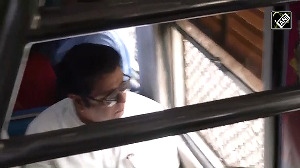Bangladeshi writer Taslima Nasreen on Monday made an impassioned plea to her "second home" India to grant her citizenship and blamed the government of West Bengal, her current residence in exile, for delaying the process.
"I have been banished from my country and am living away from home for the last 12 years. I don't want to live in Europe any more," Taslima, who flew to Delhi on Sunday night from London to attend a publishers' convention, told PTI.
"India is my second home. I have been granted a six-month visa, but citizenship is being repeatedly refused to me," the author of works that have created controversies in Bangladesh and India said.
She blamed the West Bengal government for "coming in the way of the Centre granting her citizenship status.
"I need a recommendation letter from the West Bengal government before the Centre can consider my request for citizenship. They (WB government) are not granting me the much-needed recommendation before I can call this country my home," said the women's rights activist who fled her country after fundamentalists, outraged at her progressive views, issued a fatwa against her.
"If I can't live in my own country, and if I have to stay close to home, where I can speak my mother tongue, write in my own language? India is the second option. Where else will I go?" asked Taslima. The writer said she will soon make a fresh application to the Centre for citizenship.
Taslima believes that the "Muslim vote bank politics could be the reason behind the West Bengal government's refusal to recommend her to the Centre for citizenship rights."
"Ideally, the Left government should not have any ideological differences with me. I write for secular forces, for upliftment of human rights and rights of women and the downtrodden wherever I am. I see no clash of views with the Left there," she said.
Once a qualified medical practitioner in Bangladesh who had to give up her career in medicine "for refusing to tow the government line", Taslima said she will continue her fight against religious extremism, fundamentalism and censorship of books.
She saw no hope of ever returning to Bangladesh, which is on the brink of a political change.
"Be it Awami League, or Bangladesh Nationalist Party, they are all the same. During poll campaigning they all apparently promised fundamentalist election partners that they would be granted rights to issue fatwas once in power," she said.
"Whoever comes to power, it will not make a difference in Bangladesh where violence against women is on the rise," Taslima said.
Not the one to closely follow Bangladeshi politics, Taslima said what the country needs is a "secular and tolerant leader" before she can even dream of coming back to her home country.
"But there is hope. I get a lot of e-mails from young people in Bangladesh who write in to tell me that things may be changing slowly," she said.
Accusing the Bangladesh government of not renewing her passport for the last two years, Taslima said she has been running from pillar to post to get this done during her exile abroad.





